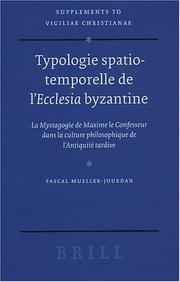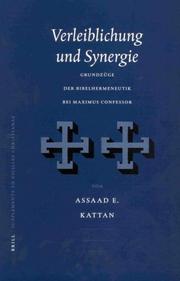| Listing 1 - 4 of 4 |
Sort by
|
Book
ISBN: 1532666004 9781532666001 9781620322000 1620322005 9781498286572 1498286577 Year: 2019 Publisher: Eugene
Abstract | Keywords | Export | Availability | Bookmark
 Loading...
Loading...Choose an application
- Reference Manager
- EndNote
- RefWorks (Direct export to RefWorks)
Maximus, --- Maximus Confessor --- Maximus --- Maxime le Confesseur --- Maximus der Bekenner --- Maximus the Confessor --- Massimo il Confessore --- Maksim Ispovednik --- Maksim Spoznavalec --- Maximos Homologetes --- Maxim Mărturisitorul --- Hagios Maximos, --- Maksim, --- Makʻsime Aġmsarebeli, --- Massimo Confessore, --- Massimo il Confessore, --- Maxim, --- Maxime le Confesseur, --- Maximos Confessor, --- Maximos, --- Maximos ho Gkraikos, --- Maximos ho Homologētēs, --- Maximus Confessor, --- Maximus of Constantinople, --- Sfântul Maxim,

ISBN: 9004142304 9786610867516 9047406850 1280867515 143370434X 9789004142305 9789047406853 9781433704345 Year: 2005 Volume: 74 Publisher: Leiden ; Boston : Brill,
Abstract | Keywords | Export | Availability | Bookmark
 Loading...
Loading...Choose an application
- Reference Manager
- EndNote
- RefWorks (Direct export to RefWorks)
This study addresses the philosophical context of the Mystagogy of Maximus the Confessor. It examines how the Byzantine monk integrates Neoplatonist topics when exposing one of the most important feature of his religious conception of the physical world or cosmology. The volume contains three chapters. The first one compares the purpose of the Mystagogy and the program of the philosophical training in late Antiquity. The second consists of two parts : (1) study of the use of the Aristotelian categories of 'when' and 'where' in the 'Ambiguum 10' of Maximus in order to analyse the status of ecclesiastical architecture and the nature of the liturgical 'synaxis' of the church (chapter 3); (2) study of the development of the categories of space and time in the works of the Neoplatonist Greek commentators of Plato and Aristotle such as Jamblichus, Proclus, Simplicius and Damascius. The third chapter offers the first extended examination of the metaphysical status of the 'ecclesia' and its dynamic activity compared to the metaphysical status of space and time required for the explanation of the Neoplatonist physical world system. Henceforth, the 'ecclesia' of the Mystagogy can be considered as the type of the providential action of God. This book provides many important new perspectives for reading the works of Maximus the Confessor, especially the Mystagogy, not only for theologians, but also for scholars interested in late Antique and Byzantine philosophy. Cette étude, consacrée au contexte philosophique de la Mystagogie de Maxime le Confesseur, examine comment le moine byzantin intègre certains concepts tirés du Néoplatonisme quand il expose les plus importantes lignes de sa conception religieuse du monde physique. Ce volume contient trois chapitres. Le premier compare l'objectif de la Mystagogie et le programme philosophique des écoles de l'Antiquité tardive. Le second comporte deux parties : (1) une étude de l'emploi des catégories 'quand' et 'où' dans l' Ambiguum 10 ' de Maxime avec pour objectif l'analyse du statut de l'architecture ecclésiale et l'analyse de la nature de la synaxe liturgique (chapitre 3); (2) une étude du développement des catégories de lieu et de temps dans les Oeuvres des Commentateurs néoplatoniciens de Platon et d'Aristote, tels Jamblique, Proclus, Simplicius et Damascius. Le troisième chapitre offre la première étude approfondie du statut métaphysique et dynamique de l' ecclesia compare au statut métaphysique du lieu et du temps requis par l'explication néoplatonicienne du monde physique. L' ecclesia de la Mystagogie sera ainsi considerée comme le type de l'action providentielle de Dieu dans le monde créé. Ce livre fournit une nouvelle perspective de lecture des Oeuvres de Maxime le Confesseur et devrait intéresser tant les théologiens que les scientifiques consacrant leurs travaux à l'Antiquité tardive et à la philosophie byzantine.
Space and time --- Church. --- Religious aspects --- Orthodox Eastern Church. --- Maximus, --- Orthodox Eastern Church --- Liturgy --- Church --- Ecclesiastical theology --- Ecclesiologie --- Ecclesiology --- Ecclésiologie --- Eglise --- Kerk --- Kerk [Leer over de ] --- Leer over de Kerk --- Theology [Ecclesiastical ] --- 276 =75 MAXIMUS CONFESSOR --- Griekse patrologie--MAXIMUS CONFESSOR --- Space of more than three dimensions --- Space-time --- Space-time continuum --- Space-times --- Spacetime --- Time and space --- Fourth dimension --- Infinite --- Metaphysics --- Philosophy --- Space sciences --- Time --- Beginning --- Hyperspace --- Relativity (Physics) --- Theology, Ecclesiastical --- People of God --- Theology --- Religious aspects&delete& --- Liturgy. --- Maximus Confessor --- Maximus --- Maxime le Confesseur --- Maximus der Bekenner --- Maximus the Confessor --- Massimo il Confessore --- Maksim Ispovednik --- Maksim Spoznavalec --- Maximos Homologetes --- Maxim Mărturisitorul --- Hagios Maximos, --- Maksim, --- Makʻsime Aġmsarebeli, --- Massimo Confessore, --- Massimo il Confessore, --- Maxim, --- Maxime le Confesseur, --- Maximos Confessor, --- Maximos, --- Maximos ho Gkraikos, --- Maximos ho Homologētēs, --- Maximus Confessor, --- Maximus of Constantinople, --- Sfântul Maxim, --- Maximus, - Confessor, Saint, - ca. 580-662. - Mystagōgia.

ISBN: 9004126694 9004313281 9789004126695 9789004313286 Year: 2003 Volume: 63 Publisher: Leiden, [Netherlands] ; Boston, Massachusetts : Brill,
Abstract | Keywords | Export | Availability | Bookmark
 Loading...
Loading...Choose an application
- Reference Manager
- EndNote
- RefWorks (Direct export to RefWorks)
This volume examines the biblical hermeneutics of Maximus the Confessor (579/580-662). Although some aspects of the Confessor's hermeneutical approach had already been tackled, a comprehensive analysis was still missing. Accordingly, this book fills a gap in Patristic studies. The study consists of three chapters. The first one deals with the logoi theory of Maximus being the ontological nucleus around which his whole theological thinking is organized. The second chapter examines Maximus' understanding of mystical ascension. Equipped with the 'ontological' and 'mystical' foundation, the third chapter analyzes thoroughly the hermeneutics of Maximus as such, attempting to show its coherence and rootedness in the general christological perspective of the Confessor. This book will be of benefit not only for byzantinists and patrologists, but also for biblical scholars interested in the history of hermeneutics and exegesis as well as for historians of philosophy and medieval ideas.
Logos (Christian theology) --- History of doctrines --- Maximus, --- Jesus Christ --- Bible --- Criticism, interpretation, etc. --- History --- 276 =75 MAXIMUS CONFESSOR --- 276:22 --- -Logos --- Word of God (Christian theology) --- Alogi --- Griekse patrologie--MAXIMUS CONFESSOR --- Patrologie en exegese --- -Maximus Confessor, Saint --- Christ --- Cristo --- Jezus Chrystus --- Jesus Cristo --- Jesus, --- Jezus --- Christ, Jesus --- Yeh-su --- Masīḥ --- Khristos --- Gesù --- Christo --- Yeshua --- Chrystus --- Gesú Cristo --- Ježíš --- Isa, --- Nabi Isa --- Isa Al-Masih --- Al-Masih, Isa --- Masih, Isa Al --- -Jesus, --- Jesucristo --- Yesu --- Yeh-su Chi-tu --- Iēsous --- Iēsous Christos --- Iēsous, --- Kʻristos --- Hisus Kʻristos --- Christos --- Jesuo --- Yeshuʻa ben Yosef --- Yeshua ben Yoseph --- Iisus --- Iisus Khristos --- Jeschua ben Joseph --- Ieso Kriʻste --- Yesus --- Kristus --- ישו --- ישו הנוצרי --- ישו הנצרי --- ישוע --- ישוע בן יוסף --- المسيح --- مسيح --- يسوع المسيح --- 耶稣 --- 耶稣基督 --- 예수그리스도 --- Jíizis --- Yéshoua --- Iėsu̇s --- Khrist Iėsu̇s --- عيسىٰ --- -Logos (Christian theology) --- -Griekse patrologie--MAXIMUS CONFESSOR --- -276 =75 MAXIMUS CONFESSOR --- 276:22 Patrologie en exegese --- -276:22 Patrologie en exegese --- Logos --- Hagios Maximos, --- Maksim, --- Makʻsime Aġmsarebeli, --- Massimo Confessore, --- Massimo il Confessore, --- Maxim, --- Maxime le Confesseur, --- Maximos Confessor, --- Maximos, --- Maximos ho Gkraikos, --- Maximos ho Homologētēs, --- Maximus Confessor, --- Maximus of Constantinople, --- Sfântul Maxim, --- Biblia --- Maximus Confessor --- Primitive and early church, ca. 30-600 A.D. --- Criticism, interpretation, etc --- عيسىٰ --- Maximus --- Maxime le Confesseur --- Maximus der Bekenner --- Maximus the Confessor --- Massimo il Confessore --- Maksim Ispovednik --- Maksim Spoznavalec --- Maximos Homologetes --- Maxim Mărturisitorul --- Logos (Christian theology) - History of doctrines - Early church, ca 30-600 --- Maximus, - Confessor, Saint, - ca. 580-662. --- Jesus Christ - History of doctrines - Early church, ca. 30-600.
Book
ISBN: 0520296192 0520956583 9780520956582 1299952844 9781299952843 9780520280427 0520280423 Year: 2014 Volume: 52 Publisher: Berkeley, California
Abstract | Keywords | Export | Availability | Bookmark
 Loading...
Loading...Choose an application
- Reference Manager
- EndNote
- RefWorks (Direct export to RefWorks)
"This book focuses on the attempts of three ascetics-John Moschus, Sophronius of Jerusalem, and Maximus Confessor-to determine the Church's power and place during a period of profound crisis, as the eastern Roman empire suffered serious reversals in the face of Persian and then Islamic expansion. By asserting visions which reconciled long-standing intellectual tensions between asceticism and Church, these authors established the framework for their subsequent emergence as Constantinople's most vociferous religious critics, their alliance with the Roman popes, and their radical rejection of imperial interference in matters of the faith. Situated within the broader religious currents of the fourth to seventh centuries, this book throws new light on the nature not only of the holy man in late antiquity, but also of the Byzantine Orthodoxy that would emerge in the Middle Ages, and which is still central to the churches of Greece and Eastern Europe"--
Church history --- Moschus, John, --- Sophronius, --- Maximus, --- Maximus Confessor --- Maximus --- Maxime le Confesseur --- Maximus der Bekenner --- Maximus the Confessor --- Massimo il Confessore --- Maksim Ispovednik --- Maksim Spoznavalec --- Maximos Homologetes --- Maxim Mărturisitorul --- Hagios Maximos, --- Maksim, --- Makʻsime Aġmsarebeli, --- Massimo Confessore, --- Massimo il Confessore, --- Maxim, --- Maxime le Confesseur, --- Maximos Confessor, --- Maximos, --- Maximos ho Gkraikos, --- Maximos ho Homologētēs, --- Maximus Confessor, --- Maximus of Constantinople, --- Sfântul Maxim, --- Sophronius Hierosolymitanus --- Sophrone de Jérusalem --- Sophronius --- Sofronius --- Sofronio, --- Sophrone, --- Everato, Gioanni, --- Eviratus, John, --- Moschos, Iōannēs, --- Moschos, Jean, --- Moschos, John, --- Moschus, Jean, --- Moschus, Johannes, --- Mosco, Juan, --- Moskh, Ioann, --- Moskhos, John, --- Mosxi, Ioane, --- 281 "04/14" --- Oosters christendom--Middeleeuwen --- History --- Religion --- Ancient --- General. --- Christianity --- Eglise --- Histoire --- Church history - 7th century --- Moschus, John, - approximately 550-619 --- Sophronius, - Saint, Patriarch of Jerusalem, - approximately 560-approximately 638 --- Maximus, - Confessor, Saint, - approximately 580-662 --- alexandria. --- anastasius. --- ancient history. --- ancient rome. --- ascetic. --- bible. --- byzantine orthodoxy. --- christian history. --- christianity. --- church fathers. --- church history. --- church power. --- constantinople. --- eastern roman empire. --- engaging. --- historical. --- holy men. --- imperial interference. --- intellectual tensions. --- john moschus. --- late antiquity. --- matters of faith. --- maximus confessor. --- power of god. --- religion. --- religious critics. --- roman empire. --- roman popes. --- sophronius of jerusalem. --- visions.
| Listing 1 - 4 of 4 |
Sort by
|

 Search
Search Feedback
Feedback About
About Help
Help News
News